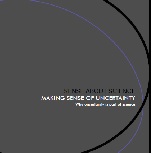 Researchers in climate science, disease modelling, epidemiology, weather forecasting and natural hazard prediction say that we should be relieved when scientists describe the uncertainties in their work. It doesn’t necessarily mean that we cannot make decisions – we might well have ‘operational knowledge’ – but it does mean that there is greater confidence about what is known and unknown.
Researchers in climate science, disease modelling, epidemiology, weather forecasting and natural hazard prediction say that we should be relieved when scientists describe the uncertainties in their work. It doesn’t necessarily mean that we cannot make decisions – we might well have ‘operational knowledge’ – but it does mean that there is greater confidence about what is known and unknown.
That was message of a publication from Sense About Science – a charitable trust that aims to help the general public understand science. Making Sense of Uncertainty was launched at the World Conference of Science Journalists at the end of June.
Researchers working in some of the most significant, cutting edge fields say that if policy makers and the public are discouraged by the existence of uncertainty, we miss out on important discussions about the development of new drugs, taking action to mitigate the impact of natural hazards, how to respond to the changing climate and to pandemic threats.
In the introduction to the guide, which has contributions from experts in many fields of earth sciences, Tracey Brown and Tabitha Innocent from Sense About Science write: “We want (even expect) certainty – safety, effective public policies, useful public expenditure. Uncertainty is seen as worrying, and even a reason to be cynical about scientific research – particularly on subjects such as climate science, the threat of disease or the prediction of natural disasters. In some discussions, uncertainty is taken by commentators to mean that anything could be true, including things that are highly unlikely or discredited, or that nothing is known.
Many scientists say that, interrogated with the question ‘But are you certain?’, they have ended up sounding defensive or as though their results are not meaningful. Instead, say the authors of the guide, we need to embrace uncertainty, especially when trying to understand more about complex systems.
In Making Sense of Uncertainty they review the current discussion and discuss:
• The way scientists use uncertainty to express how confident they are about results
• That uncertainty can be abused to undermine evidence or to suggest anything could be true: from alternative cancer treatments to anthropogenic CO2 not changing the atmosphere
• Why uncertainty is not a barrier to taking action – decision makers usually look for a higher level of certainty for an operational decision (such as introducing body scanners in airports) than for a decision based on broader ideology or politics (such as reducing crime rates).